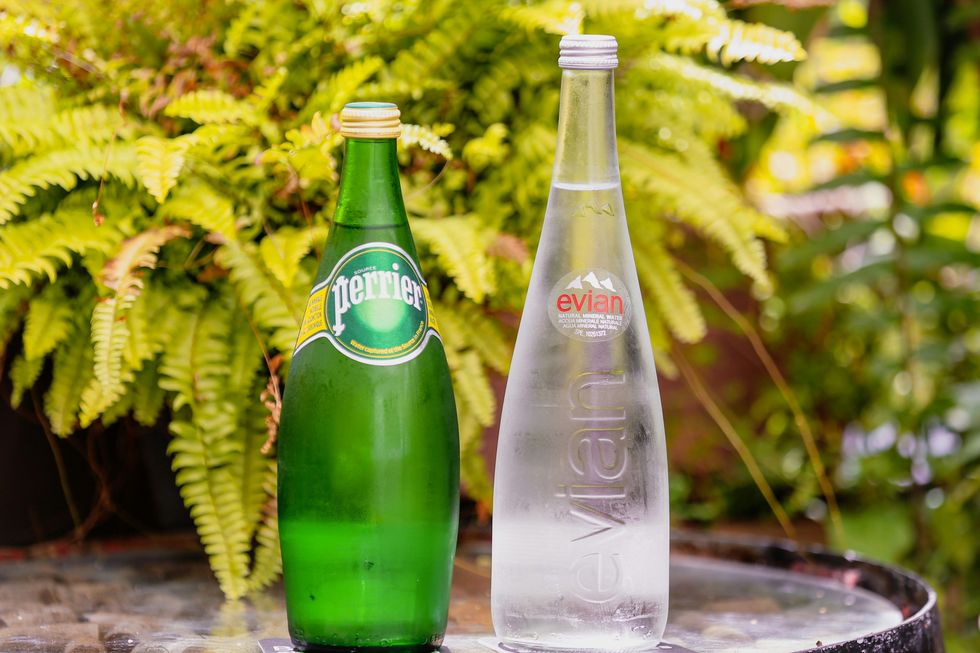Consider These Key Things Before Quitting Your Job For Self-Employment

Self-employment is something many people prefer or aspire to, as being your own boss is both admirable and empowering. And women are bossing up more than ever, representing almost 40% of all self-employed professionals. Being self-employed myself, I can attest to the benefits, but like everything in life, there are two dueling sides to every coin. And if you're considering taking the leap from 9-to-5er to self-employed, there's a lot to consider before totally pulling the plug on your day job.
Here are a few things to know, from my own experience, before transitioning into self-employment:
1. Recognize that self-employment is not entrepreneurship.
There are key differences between being an entrepreneur and being self-employed that many people get all mixed up and confused about. The terms are often used interchangeably, but they are definitely not the same.
A self-employed person operates just like an employee, often offering services and talents to business owners, nonprofits, or organizations. An entrepreneur typically offers goods and services to a client or customer, registers their business for tax purposes, and can reap the benefits of resources like business bank accounts, financing, and investments.
When you're self-employed, you often don't get paid if you don't work, most typically as a freelancer or on a project-by-project or client-by-client basis. When you're an entrepreneur, you can successfully scale a business where you can reap the benefits whether you're actively working in it or not.
You can indeed launch a one-person business (i.e., as a limited liability company or LLC), but there are requirements related to that, particularly when it comes to taxes. There are also things to consider, such as lifestyle, goals, and risk tolerance. The annual and financial obligations entrepreneurs have aren't the same as self-employed professionals, like additional taxes, filing fees, and mandatory financial reports.

pixdeluxe/Getty Images
(I know some of y'all entrepreneurs might be reading this with a side-eye, but hey, not every self-employed person is a business person, and some simply might not want the extra maintenance and responsibilities of having a registered business, no matter the perks.)
While I'm not discouraging any self-employed person from launching a business, knowing the difference between the two is important because it sets the tone for how you approach the work that you do, your expectations on the lifestyle and requirements, and what benefits might be afforded to you.
Many entrepreneurs can employ people, scale their businesses for expansion, get capital investment, and even take days, weeks, or months off without having to actually work yet still reap the benefits. This is often not the case for a self-employed person whose salary largely depends on actual work hours, paid invoices, and strategic budgeting.
2. Inform yourself about the tax obligations and other financial shifts that might happen once you are self-employed.
When you're working a 9-to-5, your company handles taking taxes out of each check. This is not the case for self-employed folk. There's a quarterly schedule that must be followed for federal taxes, and there are other regulations based on the state where you primarily work (even if you're working remote). If you're used to having a hands-off approach to taxes (other than going to the tax preparer once a year), you definitely want to shift your expectations and get to know all the information you can about self-employment taxes.
Also, the way you budget might be a bit different when you're self-employed. If you find, for example, that you're constantly living check to check or that you're used to a guaranteed paycheck every two weeks, you'll need to shift the way you look at how money flows in your household.
Self-employment can include periods where you're not getting paid as consistently, and many companies work with invoices that are paid 30, 60, or even 90 days after you've finished the work you've done for them. Keep this in mind and plan accordingly based on the industry you'll be working within.
Talk to a tax or personal finance professional to find out about how your finances and tax obligation might change once you decide to become self-employed, and then set up a plan so that you won't get caught slipping come Tax Day. The process is different for self-employed people, and this is an important aspect of the process that will save you lots of money and stress in the long run.
I learned the hard way to negotiate, upfront, a set period of time for my services (when applicable and reasonable) to be written into a contract and to set my rates not solely based on my previous salary but considering additional costs like WIFI, travel, health insurance that I have to pay for out-of-pocket, home office technology and tools, and the time it actually takes to complete tasks. The pandemic brought home how super-important this was because, as a freelancer, someone can simply cut you with no compensation or warning.
3. Get to know your true strengths and weaknesses when it comes to work ethic, skills, environment, and motivation.
Self-employment is definitely not for the faint at heart. It can be a constant hustle in the beginning, and if you're not careful, you might end up wondering how you'll pay your rent or car note simply because you don't have clients or work lined up. It's good to be a self-starter and super-organized. It's also good to brush up on your marketing, communications, and sales skills because you'll need to pitch yourself and your background in order to land projects and clients.
While working your full-time job, take a few courses or find a self-employed mentor so that you can strengthen your skills in areas where you might need some improvement (i.e., pitching, online marketing, social media branding, or project management.) Practice self-employment on the side as an intern or with a side hustle so you can learn a bit more about yourself that you might be overlooking while serving as an employee.
Being self-employed means you become multiple departments in one person. For example, your current company provides support like assistants, accounting departments, legal teams, and IT, so you might not be used to having to handle all of those things on your own. For some, this can be overwhelming, while others find the challenge invigorating and worth the sacrifice if it means having autonomy and financial and time freedom.
Also, if you're motivated to do your best by being around teams or working in an office, self-employment might be too isolating for you. True, there are groups and co-working cultures you can join, but it's definitely not the same as having built-in comradery of fellow full-timers at a company. Be aware of these things so that you're realistically making a choice that suits the life you want to live and the work experience you want to have in order to thrive.

PeopleImages/Getty Images
4. Create an emergency fund solely for the transition.
While you're working a 9-to-5, create a separate savings account just for the transition. Anything can happen between quitting your job and getting your first freelance gig, client, or project. When I first stepped out to be self-employed, I thought I had the dream client, only to find out that it wasn't a good fit and I'd be looking for a new one after six months. This might happen several times before you really hit a groove, find your fit, build up your reputation, and get consistent work.
Having a financial cushion outside of your usual emergency fund helps to soften the blow if something like a client loss, a late invoice payment, or an unexpected work-related expense (i.e., computer replacement or broken equipment repair) comes up.
Sometimes, self-employment can include certain up-front costs like renting an office space, investing in new technology or other tools, travel expenses, or hiring other self-employed professionals (i.e., a consultant, web designer, or tax preparer), so you'll want to be smart, be prepared, and keep your receipts.
5. Understand your why.
Every great and sustainable journey starts with a good reason---a "why" that keeps a person going. If you know your why, you're less likely to just give up when things get rough, and you're less likely to make costly, mentally and physically draining mistakes. I decided to go for full-time self-employment because, after more than a decade working in my field, I really felt burned out at the time, began to resent not being promoted as quickly as I thought I should, and saw that I could make more money contracting my skills and talents out than working full-time for one company.
I also loved that I could pick and choose who I worked with and align my values with the projects that I was part of (versus being forced due to being a full-time employee beholden to a contract and the so-called values of a corporation or company.)
I've made quite a few mistakes over the years, but my why remains the same, and when times get hard, I simply remember the overall peace, flexibility, and autonomy I have in serving the women millennial audiences I want to serve through journalism and communications.
6. Be sure that you're offering services or expertise that can be used for years to come and that's competitive.
If you're considering self-employment, be sure your skills are competitive and have a future of need. I knew, even a decade ago, that much of the media industry was going the freelance route, and today, with layoffs becoming commonplace and full-time employee budgets being cut, contract work has become the name of the game. I saw this industry shift coming a mile away, and, like my early foray into digital media before publishing houses were monetizing it, I knew eventually, freelance work would be abundant and preferred.
If you're already doing a job that is in high demand or you offer something niche and one-of-a-kind, working for yourself might be the move. But if you've found that your current skills might be obsolete in the next two to five years, try learning another skill, shifting how you do the work you do, or tapping into another passion that can ensure you're offering something valuable in a market where it's direly needed.
Self-employment can be a joy and a pain, and for many of us, it's the only choice for self-care, mental wellness, and financial freedom. If you're considering taking the leap, take into account these tips and go forward in bold confidence, informed, and prepared.
Let’s make things inbox official! Sign up for the xoNecole newsletter for daily love, wellness, career, and exclusive content delivered straight to your inbox.
Featured image LaylaBird/Getty Images
This Is How To Keep 'Holiday Season Stress' From Infecting Your Relationship
Hmph. Maybe it’s just me, but it seems like there is something really weird happening in the fall season air (because winter doesn’t officially begin until December 21) that cuddle season is in full swing while break-up season is as well. In fact, did you know that break-ups are so popular during the holiday season that December 11 is deemed Break-Up Day?
The reasons why relationships shift around this time vary; however, I did both roll my eyes and chuckle when I read that a very popular one is because it’s an easy way to get out of getting one’s significant other a Christmas present. SMDH.
Anyway, I personally think that the less shallow folks out here may contemplate calling things “quits” or they at least distance themselves a bit from their partner (and what I’m referring to is serious relationships) due to all of the stress and strain that oftentimes comes with the holidays whether it be financial, familial, due to their tight schedules or something else.
Listen, I would hate for you and your man to miss the fun and happiness of experiencing this time of year, all because you are so overwhelmed or irritated that you can’t really enjoy it. That’s why I have a few practical tips for how to avoid allowing the typical holiday season stress from INFECTING your relationship.
Manage Your Expectations
 Giphy
GiphyUnmanaged expectations. If there is a main reason why the holiday season tends to be so stress-filled for so many people, I’d bet good money that this is the cause. And when you’re in a long-term relationship, expectations can manifest themselves in all sorts of cryptic and/or unexpected ways. You might have relatives who assume that you are going to be with them for Thanksgiving or Christmas when you have other plans in mind. You might be thinking that you are going to spend one amount for presents while your man is thinking something totally different. When it comes to scheduling, your signals may be crossed.
And you know what? To all of these scenarios, this is where clear and consistent communication come in. Don’t assume anything. Don’t dictate anything either. From now until New Year’s, mutually decide to check in once a week, just to make sure that you are both on the same page as it relates to the holidays and what you both are thinking will come along with it. The less blindsided you both feel, the less stressed out you will be. Trust me on this.
Set (and Keep) a Budget
 Giphy
GiphyOkay, so I read that last year, 36 percent of Americans incurred some type of holiday-related debt. Hmph. Last year, there was still some sense of normalcy in this country, chile, so I can only imagine what finances are gonna look like over the next several weeks. That said, since I don’t know a lot of people who don’t find being broke stressful, make sure that you and your bae set a budget and then stick to it this year — no ifs, ands or buts.
Because really, y’all — it doesn’t make sense to deplete savings and/or max out credit cards for a few days of giggles only to be damn near losing your mind because you don’t know how to make ends meet come Dr. Martin Luther King, Jr. Day.
And by the way, this tip doesn’t just speak to things like food and gifts; I also mean travel. If it doesn’t make a ton of sense (or cents) to be all over the place this year — DON’T BE.
Keep Matthew 5:37 at the Forefront
 Giphy
GiphyIf off the top of your head, you don’t know what Matthew 5:37 says, no worries, here ya go: “But let your ‘Yes’ be ‘Yes,’ and your ‘No,’ ‘No.’ For whatever is more than these is from the evil one.” That verse right there? Oh, it’s a boundaries lifesaver! I say that because do you see “maybe” or “I’ll think about it” in there? Nope. LOL. It says that you should tell people “yes” or “no” and leave it at that — and that complements Anne Lamott’s quote, “’No’ is a complete sentence” impeccably well. Yeah, you’ve got to remember that anything beyond a yes or no to a request is privileged information; you don’t owe anyone details or an explanation.
Besides, if you are really honest with yourself, when someone asks you something and you give a “Umm, let me think about it” kind of reply, more times than not, you already know what your answer is going to be — so why not let you both off of the hook? Give your response. Commit to that. And let everyone (including yourself) get on with their lives and schedules.
I promise you that when it comes to those holiday parties, you are pissing more folks off by not RSVP’ing or doing so and not showing up than just saying, “Thank you but not this year” off the rip.
Remember That Your Personal Space Is Privilege Not a Right
 Giphy
GiphyA friend of mine recently bought a new house and invited me over to come see it. He’s a single man with no children, so as I was taking in all of the space that he had, especially as I walked through his finished basement, I joked about relatives coming to live with him. “Hell no” and “absolutely not” were pretty much his immediate responses as he went on to say that some folks even had the nerve to be offended when he told them that he had no intentions on taking DNA in.
Ain’t it wild how people think that your stuff is their right? And yes, that brings me to my next point. Your home is your sanctuary space. If you want to host folks this year — cool. If not, ALSO COOL. Please don’t let folks (family included) guilt you into how they want you to act or even into what they would do if the shoe was on the other foot. You are not them — and as one of my favorite quotes states, “If two people were exactly alike, one of them would be unnecessary.” (A man by the name Larry Dixon said that.)
Hell, my friends? They know that I am good for sending them random things that they need or even want all throughout the year. Coming over to hang out at my pace, though. Uh-uh. Chalk it up to being a card-carrying member of the ambivert club yet I like keeping my living space personal — and I sleep like a baby, each and every night, for feeling that way.
Always remember that your space, your time, your resources, your energy and shoot, yourself period (including your relationship), are all things that are your own. You get to choose how, when and why you want to share them. The holiday season is certainly no exception.
Cultivate Some “You Two Only” Traditions
 Giphy
GiphyIt’s not uncommon for some couples to hit me up after the holiday season to “detox.” Sometimes it’s due to the financial drama (and sometimes trauma) that they experienced. Sometimes it’s because they allowed their relatives (especially in-laws) to get more into their personal business than they should’ve. More than anything, though, it tends to be because they didn’t get enough quality time together and so ended up feeling “disconnected.”
Please don’t let that happen. Listen, I’m not even a holidays kind of woman and yet, I will absolutely sit myself down with some hot chocolate and chocolate chip cookies to enjoy a Hallmark holiday film or two. Aside from the fact that most of them are lighthearted and sweet, I also like that they usually focus on couples loving on each other amidst all of the holiday beauty and ambiance — which is something that all couples should set aside some time to do.
Maybe it’s a vacation. Maybe it’s a staycation. Or maybe it’s my personal favorite, A SEXCATION. Whether it’s for a few days, the weekend or even overnight — don’t you let the holidays go by without setting aside time for you and your man to celebrate one another. Don’t you dare (check out “Are You Ready To Have Some Very Merry 'Christmas Sex'?”).
GET. SOME. REST.
 Giphy
GiphyI once read that 8 out of 10 people get stressed out over the holidays and 3 out of 10 lose sleep during to it — and when you’re stress-filled and sleep-deprived, that can absolutely lead to hypersensitivity, making mountains out of molehills and even not being in the mood for sex.
Your relationship can’t afford to go through any of this, so definitely make sure to prioritize rest. I don’t care how unrealistic it might seem during this time, sleep should never be seen as a luxury; it will always and forever be a great necessity.
That said, try to get no less than six hours of shut-eye in (check out “6 Fascinating Ways Sex And Sleep Definitely Go Hand In Hand”) and even ask your bae to take a nap with you sometimes (check out “Wanna Have Some Next-Level Sex? Take A Nap, Sis.”). Not only will sleep help to restore your mind, body and spirit but, when it’s with your partner, it’s an act of intimacy that can make you both feel super connected, even in the midst of what might feel like chaos.
___
Holiday season stress is real. Still, never give it the permission or power to throw your relationship off. Put you and your man first and let the holidays be what they are gonna be, chile.
Let’s make things inbox official! Sign up for the xoNecole newsletter for love, wellness, career, and exclusive content delivered straight to your inbox.
Featured image by Shutterstock
I wish I enjoyed drinking plain ole’ water. I don’t, though, and, at this point, I doubt that I ever will. It’s not something that I’m proud of or anything, but like I’ve said in other articles on this platform, to me, water is so damn boring; it’s literally like drinking “wet air.”
That doesn’t mean I don’t accept that it’s a “necessary evil” being that we all are made up of so much water and being dehydrated (which is something that a lot of us are) can cause so many health-related issues, including blurred vision, muscle cramps, dried skin, fatigue and even moodiness.
That’s why, over the years, I’ve been intentional about figuring out ways to get more agua into my body without feeling like it’s a chore or something to dread. And now, I want to pass some of those hacks on to you, just in case you happen to totally relate to where I am coming from.
If something that you want to do more of right through here is get extra H2O into your system, here are 10 tips that can absolutely help to make that possible.

Unsplash
1. Invest in a Fun Water Bottle
There’s a far greater chance that you are going to drink water if you have a water bottle around you. So, cop yourself a cute one — one that will help you to stay motivated. A tumbler that I purchased some time back, just because I thought it was cute as hell, simply says, “Make Better Coochie Decisions” (amen?-LOL). Honestly, that doesn’t just have to apply to sex but how you treat your vagina overall — and that includes making sure that “she” has all of the fluids that she needs.
2. Try Some Sparkling Water or Mineral Water
At this point, I should take stock in Waterloo. It currently is my favorite kind of sparkling water and it has definitely made getting more water into my system easier to do. That’s because I will add some limes to it or a bit of fruit juice to it and that makes drinking water less “meh” for me. Another type of water that has bubbles in it is sparkling mineral water; it can also be beneficial since it contains magnesium, potassium and calcium.

Unsplash
3. Go Halfsies with Your Other Drinks of Choice
Speaking of making some all-natural soda (which is basically what happens when you add juice to sparkling water or sparkling mineral water), you can find yourself drinking more water while consuming less calories if you fill up your glass with half of your favorite fruit juice and half of some sparkling water. More times than not, the juice doesn’t even taste watered down. Try it before you doubt me.
4. Collect Some Infused Water Recipes
I’m forever gonna be a fan of infused water; that’s because it’s water that has fresh fruits and/or veggies in them — and it doesn’t get any healthier than that. Plus, infused water tends to take on the taste of whatever fruits or vegetables that you put into the water (if you let the stuff soak for a couple of hours), so that the water doesn’t taste so boring and bland. Wanna try a few recipes? You can check out some here and here.

Unsplash
5. Make Slushies Instead of Smoothies
Are you someone who enjoys consuming smoothies? Well, if you want to get more water into your system, how about going with a slushie instead? Although it is true that some smoothies have water as a base, the most bomb ones use milk (or a milk alternative) or yogurt. Slushies, on the other hand, typically go with crushed ice (which is frozen water) instead. That said, some (pardon the pun) cool slushy recipes can be found here, here and here.
6. Use Water As Your “Drink Chaser”
Another great thing about water is it can help to keep you from overeating; it does that by causing you to feel full if you drink it while you are eating. And speaking of calorie-counting, if you don’t want to give up your favorite drink at mealtime, one way to keep from downing 2-3 glasses of it at a time is to use water as your “chaser.” What I mean by that is, after enjoying a glass of your favorite beverage, “chase it down” with a glass of water. That should satisfy your want for what you want without overdoing it.

Unsplash
7. Eat Foods That Are High in Water Content
Another way to get more water into your body is to eat foods that have a ton of water in them. Some that top the list include lettuce (96 percent); cucumber (95 percent); zucchini (95 percent); celery (95 percent); strawberries (91 percent); cantaloupe (90 percent), and peaches (89 percent).
8. Have a Ball with Your Ice Cubes
Ice cubes are frozen water, right? That’s why most of us prefer to enjoy our drinks before the ice cubes melt because melted cubes water down whatever it is that we are consuming. And so, for this very reason, add more ice cubes to your drinks — and have fun making them. You can add juice, fruit and/or mint leaves while making your cubes. That way, they are aesthetically-pleasing; plus, they will also add more flavor to your water once the ice cubes actually melt.

Unsplash
9. Add Some Non-Alcohol Cordial to Your Water
If you’re fine with just having a tad of taste in your water, why not add a bit of cordial to it? Cordial is simply a type of tonic, syrup or sweetener (that can contain alcohol or not) that can help to make your water more…interesting. Some alcohol-based cordials can be found here. Some non-alcoholic recipes are located here.
10. Technically, Herbal Tea Counts
Tea is always gonna be my thing. That’s why I’ve penned articles on it for the site like “10 Different Ways Herbal Teas Can Fit Into Your Beauty Regimen”, “10 'Uncommon' Teas You Should Add To Your Stash (& Why)” and “I've Got 10 Teas That Will Help You To Age (Even More) Gracefully” And y’all, if you want to get a lot more water into your system yet a tall glass of water only isn’t your — pardon the pun — cup of tea, make some iced herbal tea instead.
It’s basically water with some herbs tossed in and, if you add some honey or raw organic coconut palm sugar to it, it will be a really sweet treat that will still be extremely hydrating (and very healthy) for you.
Water that is a bit more exciting for you…now. LOL.
Drink up!
Let’s make things inbox official! Sign up for the xoNecole newsletter for love, wellness, career, and exclusive content delivered straight to your inbox.
Featured image by Unsplash









